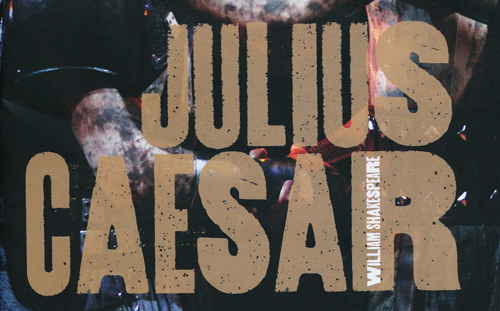
Julius Caesar is Shakespeare’s summer blockbuster, positively bristling with action packed violence. It’s a miracle Ridley Scott and Russell Crowe haven’t got their manly mitts all over it. But maybe it’s Shakespeare’s premature ejaculation that’s putting them off; the first act may be dripping with quotes like jewels, climaxing in Mark Antony’s ‘Friends, Romans..’ (you know the rest), but the second feels distinctly limp. What a disappointment.
Still you can’t blame this on the RSC or Lucy Bailey, whose rich production bleeds Shakespeare’s grisly text for everything it’s got. From the outset we are thrust into a visceral world of wrestling men, sweaty with battle and thick with ambition. Rome is a city of warriors and revellers, with William Dudley’s floating projections of coldly postmodern yet classical structures and braying flickering crowds, offering little consolation or comfort. Bailey grips this chaos tightly, with the latent aggression tightly controlled through clever choreography and power play staging.
We are thrust into a visceral world of wrestling men, sweaty with battle and thick with ambition.
Greg Hicks’ Caesar controls the rabble with a cocky strut befitting a King. It’s an underplayed but commanding performance and he dies beautifully taking us with him with each desperate lunge and gasping thrust. He is given a towering elegy by Darrell D’Silva whose Mark Antony has the crowd, and us, eating out of the palm of his hand. Wracked with grief, this giant is crippled by Caesar’s death, silken in his deception and contemptuous in his triumphant manipulation.
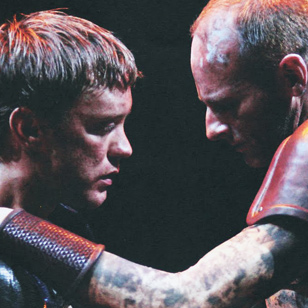 Sam Troughton’s Brutus is less convincing, clothed like a white friar his piety is irritating and he struggles to convince with his guilt wracked soliloquies. This Brutus’ love for Caesar feels more like a light affection, Doherty’s absence of passion completely taking the sting out of the infamous gasp of betrayal, ‘Et tu Brute’. His bond with the lean and hungry eyed Cassius (a solid John Mackay) is more believable, but remarkably for a relationship at the heart of the second act, is terribly dull. It is only when he is with his fellow conspirators that Troughton blossoms into a charismatic leader and in these few scenes we get to glimpse Shakespeare’s tormented anti-hero.
Sam Troughton’s Brutus is less convincing, clothed like a white friar his piety is irritating and he struggles to convince with his guilt wracked soliloquies. This Brutus’ love for Caesar feels more like a light affection, Doherty’s absence of passion completely taking the sting out of the infamous gasp of betrayal, ‘Et tu Brute’. His bond with the lean and hungry eyed Cassius (a solid John Mackay) is more believable, but remarkably for a relationship at the heart of the second act, is terribly dull. It is only when he is with his fellow conspirators that Troughton blossoms into a charismatic leader and in these few scenes we get to glimpse Shakespeare’s tormented anti-hero.
Bailey has delivered another meaty piece of theatre; if you love Julius Caesar you’ll relish this gruesomely classy production.
**** (4 stars)
Runs until 5th February 2011
More info
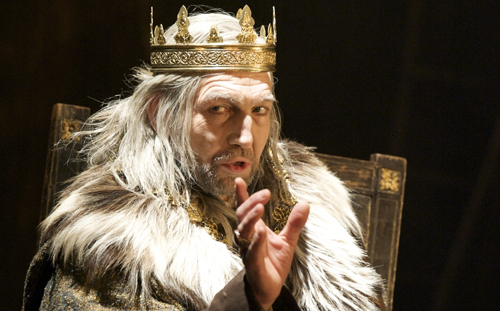
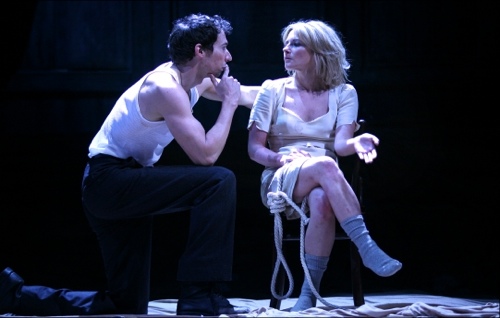
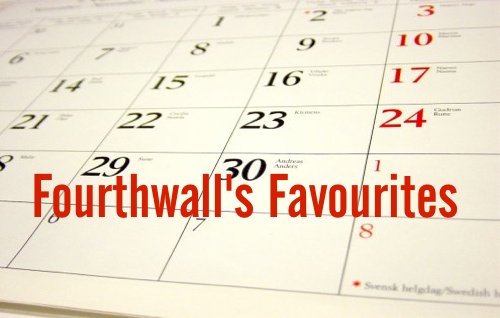
1 Trackback / Pingback